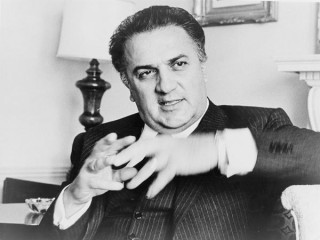
Federico Fellini biography
Date of birth : 1920-01-20
Date of death : 1993-10-31
Birthplace : Rimini, Italy
Nationality : Italian
Category : Famous Figures
Last modified : 2011-05-02
Credited as : Film director, Praemium Imperiale award, surrealist fantasy
The Italian film director Federico Fellini began as an exponent of poetic neorealism and later became the cinema's undisputed master of psychological expressionism and surrealist fantasy.
Federico Fellini was born of middle-class family on the rocky Adriatic coast of Rimini. At the age of 12 he ran away from home to join a traveling circus and in following years supported himself as a minor stage actor, newspaper cartoonist, and radio scriptwriter. Shortly after his marriage to actress Giulietta Masina, who would later play important roles in several of his major films, Fellini was asked by the noted actor and director Aldo Fabrizi to collaborate with him on several motion picture scenarios.
In 1945 Fabrizi introduced Fellini to the celebrated cinema director Roberto Rosselini, who offered him the opportunity to work on the script and serve as assistant director of Open City, a powerfully realistic work which depicted the Italian underground resistance to Nazi occupation. The pair continued their collaboration on the successful wartime drama Paisan (1946), and the controversial religious parable The Miracle (1948), the story of an innocent peasant woman who mistakes a crude tramp for St. Joseph. Although The Miracle was in style and execution essentially a Rosselini production, its thematic ambiguity and elusive poetry distinguished it from the director's more literal neorealist efforts. Two years later, under the technical supervision of Alberto Lattuada, Fellini made his directorial debut with Variety Lights, an intensely personal study of theatrical life, strikingly anticipatory in its images of the desolation and ennui of the bleak emotional landscapes of his later masterpieces. He then examined the tawdry, shallow world of movie stardom in a pathetic comedy, The White Sheik.
With I Vitelloni (1953) Fellini's social microcosm expanded to include the frustrated, maladjusted lives of the provincial middle class, in a penetrating analysis of youthful malaise. But more than any of his previous work, La Strada (1954) established Fellini as one of the great cinematic minds of the postwar years. Painfully touching and allegorically suggestive, it told of a bizarre and tortured relationship involving a kindhearted but simpleminded girl, a brutal itinerant strongman, and a poetic, self-sacrificing clown. Less ambitious philosophically though equally brilliant in execution, Il bidone (1955) presented with sympathy and wit the lives of a group of small-time swindlers. Finally, with Nights of Cabiria (1957), the moving tale of a prostitute, Fellini reached the artistic culmination of his career as a romantic realist.
The director's fondness for jesuitical symbolism, sexual degradation, grotesquerie, and psychological Grand Guignol, visible in even his more naturalistic works, achieved overt expression in La Dolce Vita (1960), a monumental morality-play fresco. Although extravagantly praised at the time (it received the Academy Award for best foreign film of 1963, as had La Strada in 1955) and still his most popular production, the film, despite several memorable sequences, seems in retrospect curiously contrived and unconvincing.
Fellini's brief segment in Boccaccio 70 (1962), depicting the prurient fantasies of a middle-aged bachelor, is of little interest except as an indicator of the director's future work as evidenced in 8 1/2 (1963, Fellini's 3rd Oscar winner), an expressionistic, stream-of-consciousness, autobiographical disclosure. Fellini's attempt to probe the psyche of his wife in Juliet of the Spirits (1964), while evocative, was far less successful, and his version of The Satyricon (1969) carried his expressionistic phase into a formless, psychedelic fantasy that lacked his usual humanity and visual grace.
An autobiographical film, Amarcord, came out in 1970, and again critics universally praised Fellini's talents, and the film earned Fellini another Oscar. Amarcord was the last film to gain great praise; in fact, most of Fellini's later work earned poor reviews. The lack of critical acclaim didn't diminish Fellini in the eyes of his fans, and he is generally regarded as the greatest Italian filmmaker. In 1993 Fellini earned his fifth and final Oscar, a lifetime achievement award. Later that year he suffered either a massive heart attack or a stroke, which left him unconscious and soon after, on October 31, he died of heart and lung failure.
Although widely praised for their visual boldness and exuberant spontaneity, Fellini's works, at their best, possess an emotional authenticity and intuitive intelligence commensurate with the dazzling brilliance of their surfaces. Fellini's greatest work was appreciated most during the 1950s through early 1970s, and he was considered a major innovator in cinematic production. Since then, his work has been dismissed as both self-indulgent and sexist.


















